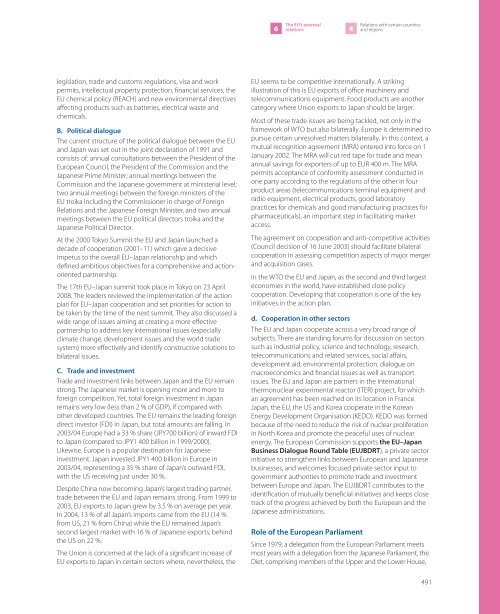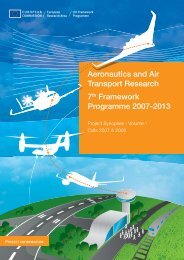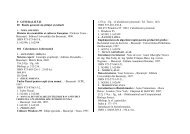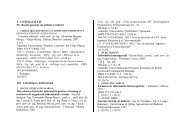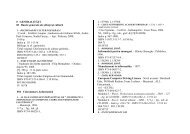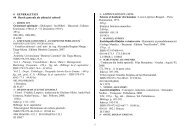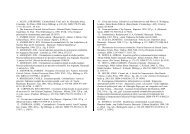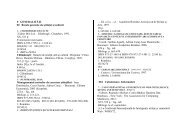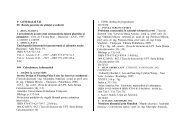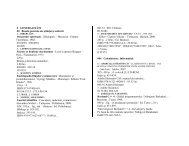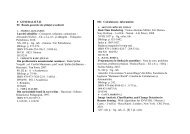Fact Sheets on the European Union â 2 - EU Bookshop - Europa
Fact Sheets on the European Union â 2 - EU Bookshop - Europa
Fact Sheets on the European Union â 2 - EU Bookshop - Europa
Create successful ePaper yourself
Turn your PDF publications into a flip-book with our unique Google optimized e-Paper software.
6<br />
The <strong>EU</strong>’s external<br />
relati<strong>on</strong>s 4<br />
Relati<strong>on</strong>s with certain countries<br />
and regi<strong>on</strong>s<br />
legislati<strong>on</strong>, trade and customs regulati<strong>on</strong>s, visa and work<br />
permits, intellectual property protecti<strong>on</strong>, financial services, <strong>the</strong><br />
<strong>EU</strong> chemical policy (REACH) and new envir<strong>on</strong>mental directives<br />
affecting products such as batteries, electrical waste and<br />
chemicals.<br />
B. Political dialogue<br />
The current structure of <strong>the</strong> political dialogue between <strong>the</strong> <strong>EU</strong><br />
and Japan was set out in <strong>the</strong> joint declarati<strong>on</strong> of 1991 and<br />
c<strong>on</strong>sists of: annual c<strong>on</strong>sultati<strong>on</strong>s between <strong>the</strong> President of <strong>the</strong><br />
<strong>European</strong> Council, <strong>the</strong> President of <strong>the</strong> Commissi<strong>on</strong> and <strong>the</strong><br />
Japanese Prime Minister; annual meetings between <strong>the</strong><br />
Commissi<strong>on</strong> and <strong>the</strong> Japanese government at ministerial level;<br />
two annual meetings between <strong>the</strong> foreign ministers of <strong>the</strong><br />
<strong>EU</strong> troika including <strong>the</strong> Commissi<strong>on</strong>er in charge of Foreign<br />
Relati<strong>on</strong>s and <strong>the</strong> Japanese Foreign Minister, and two annual<br />
meetings between <strong>the</strong> <strong>EU</strong> political directors troika and <strong>the</strong><br />
Japanese Political Director.<br />
At <strong>the</strong> 2000 Tokyo Summit <strong>the</strong> <strong>EU</strong> and Japan launched a<br />
decade of cooperati<strong>on</strong> (2001–11) which gave a decisive<br />
impetus to <strong>the</strong> overall <strong>EU</strong>–Japan relati<strong>on</strong>ship and which<br />
defined ambitious objectives for a comprehensive and acti<strong>on</strong>oriented<br />
partnership.<br />
The 17th <strong>EU</strong>–Japan summit took place in Tokyo <strong>on</strong> 23 April<br />
2008. The leaders reviewed <strong>the</strong> implementati<strong>on</strong> of <strong>the</strong> acti<strong>on</strong><br />
plan for <strong>EU</strong>–Japan cooperati<strong>on</strong> and set priorities for acti<strong>on</strong> to<br />
be taken by <strong>the</strong> time of <strong>the</strong> next summit. They also discussed a<br />
wide range of issues aiming at creating a more effective<br />
partnership to address key internati<strong>on</strong>al issues (especially<br />
climate change, development issues and <strong>the</strong> world trade<br />
system) more effectively and identify c<strong>on</strong>structive soluti<strong>on</strong>s to<br />
bilateral issues.<br />
C. Trade and investment<br />
Trade and investment links between Japan and <strong>the</strong> <strong>EU</strong> remain<br />
str<strong>on</strong>g. The Japanese market is opening more and more to<br />
foreign competiti<strong>on</strong>. Yet, total foreign investment in Japan<br />
remains very low (less than 2 % of GDP), if compared with<br />
o<strong>the</strong>r developed countries. The <strong>EU</strong> remains <strong>the</strong> leading foreign<br />
direct investor (FDI) in Japan, but total amounts are falling. In<br />
2003/04 Europe had a 33 % share (JPY700 billi<strong>on</strong>) of inward FDI<br />
to Japan (compared to JPY1 400 billi<strong>on</strong> in 1999/2000).<br />
Likewise, Europe is a popular destinati<strong>on</strong> for Japanese<br />
investment. Japan invested JPY1 400 billi<strong>on</strong> in Europe in<br />
2003/04, representing a 35 % share of Japan’s outward FDI,<br />
with <strong>the</strong> US receiving just under 30 %.<br />
Despite China now becoming Japan’s largest trading partner,<br />
trade between <strong>the</strong> <strong>EU</strong> and Japan remains str<strong>on</strong>g. From 1999 to<br />
2003, <strong>EU</strong> exports to Japan grew by 3.5 % <strong>on</strong> average per year.<br />
In 2004, 13 % of all Japan’s imports came from <strong>the</strong> <strong>EU</strong> (14 %<br />
from US, 21 % from China) while <strong>the</strong> <strong>EU</strong> remained Japan’s<br />
sec<strong>on</strong>d largest market with 16 % of Japanese exports, behind<br />
<strong>the</strong> US <strong>on</strong> 22 %.<br />
The Uni<strong>on</strong> is c<strong>on</strong>cerned at <strong>the</strong> lack of a significant increase of<br />
<strong>EU</strong> exports to Japan in certain sectors where, never<strong>the</strong>less, <strong>the</strong><br />
<strong>EU</strong> seems to be competitive internati<strong>on</strong>ally. A striking<br />
illustrati<strong>on</strong> of this is <strong>EU</strong> exports of office machinery and<br />
telecommunicati<strong>on</strong>s equipment. Food products are ano<strong>the</strong>r<br />
category where Uni<strong>on</strong> exports to Japan should be larger.<br />
Most of <strong>the</strong>se trade issues are being tackled, not <strong>on</strong>ly in <strong>the</strong><br />
framework of WTO but also bilaterally. Europe is determined to<br />
pursue certain unresolved matters bilaterally. In this c<strong>on</strong>text, a<br />
mutual recogniti<strong>on</strong> agreement (MRA) entered into force <strong>on</strong> 1<br />
January 2002. The MRA will cut red tape for trade and mean<br />
annual savings for exporters of up to <strong>EU</strong>R 400 m. The MRA<br />
permits acceptance of c<strong>on</strong>formity assessment c<strong>on</strong>ducted in<br />
<strong>on</strong>e party according to <strong>the</strong> regulati<strong>on</strong>s of <strong>the</strong> o<strong>the</strong>r in four<br />
product areas (telecommunicati<strong>on</strong>s terminal equipment and<br />
radio equipment, electrical products, good laboratory<br />
practices for chemicals and good manufacturing practices for<br />
pharmaceuticals), an important step in facilitating market<br />
access.<br />
The agreement <strong>on</strong> cooperati<strong>on</strong> and anti-competitive activities<br />
(Council decisi<strong>on</strong> of 16 June 2003) should facilitate bilateral<br />
cooperati<strong>on</strong> in assessing competiti<strong>on</strong> aspects of major merger<br />
and acquisiti<strong>on</strong> cases.<br />
In <strong>the</strong> WTO <strong>the</strong> <strong>EU</strong> and Japan, as <strong>the</strong> sec<strong>on</strong>d and third largest<br />
ec<strong>on</strong>omies in <strong>the</strong> world, have established close policy<br />
cooperati<strong>on</strong>. Developing that cooperati<strong>on</strong> is <strong>on</strong>e of <strong>the</strong> key<br />
initiatives in <strong>the</strong> acti<strong>on</strong> plan.<br />
d. Cooperati<strong>on</strong> in o<strong>the</strong>r sectors<br />
The <strong>EU</strong> and Japan cooperate across a very broad range of<br />
subjects. There are standing forums for discussi<strong>on</strong> <strong>on</strong> sectors<br />
such as industrial policy, science and technology, research,<br />
telecommunicati<strong>on</strong>s and related services, social affairs,<br />
development aid, envir<strong>on</strong>mental protecti<strong>on</strong>, dialogue <strong>on</strong><br />
macroec<strong>on</strong>omics and financial issues as well as transport<br />
issues. The <strong>EU</strong> and Japan are partners in <strong>the</strong> internati<strong>on</strong>al<br />
<strong>the</strong>rm<strong>on</strong>uclear experimental reactor (ITER) project, for which<br />
an agreement has been reached <strong>on</strong> its locati<strong>on</strong> in France.<br />
Japan, <strong>the</strong> <strong>EU</strong>, <strong>the</strong> US and Korea cooperate in <strong>the</strong> Korean<br />
Energy Development Organisati<strong>on</strong> (KEDO). KEDO was formed<br />
because of <strong>the</strong> need to reduce <strong>the</strong> risk of nuclear proliferati<strong>on</strong><br />
in North Korea and promote <strong>the</strong> peaceful uses of nuclear<br />
energy. The <strong>European</strong> Commissi<strong>on</strong> supports <strong>the</strong> <strong>EU</strong>–Japan<br />
Business Dialogue Round Table (<strong>EU</strong>JBDRT), a private sector<br />
initiative to streng<strong>the</strong>n links between <strong>European</strong> and Japanese<br />
businesses, and welcomes focused private sector input to<br />
government authorities to promote trade and investment<br />
between Europe and Japan. The <strong>EU</strong>JBDRT c<strong>on</strong>tributes to <strong>the</strong><br />
identificati<strong>on</strong> of mutually beneficial initiatives and keeps close<br />
track of <strong>the</strong> progress achieved by both <strong>the</strong> <strong>European</strong> and <strong>the</strong><br />
Japanese administrati<strong>on</strong>s.<br />
Role of <strong>the</strong> <strong>European</strong> Parliament<br />
Since 1979, a delegati<strong>on</strong> from <strong>the</strong> <strong>European</strong> Parliament meets<br />
most years with a delegati<strong>on</strong> from <strong>the</strong> Japanese Parliament, <strong>the</strong><br />
Diet, comprising members of <strong>the</strong> Upper and <strong>the</strong> Lower House,<br />
491


